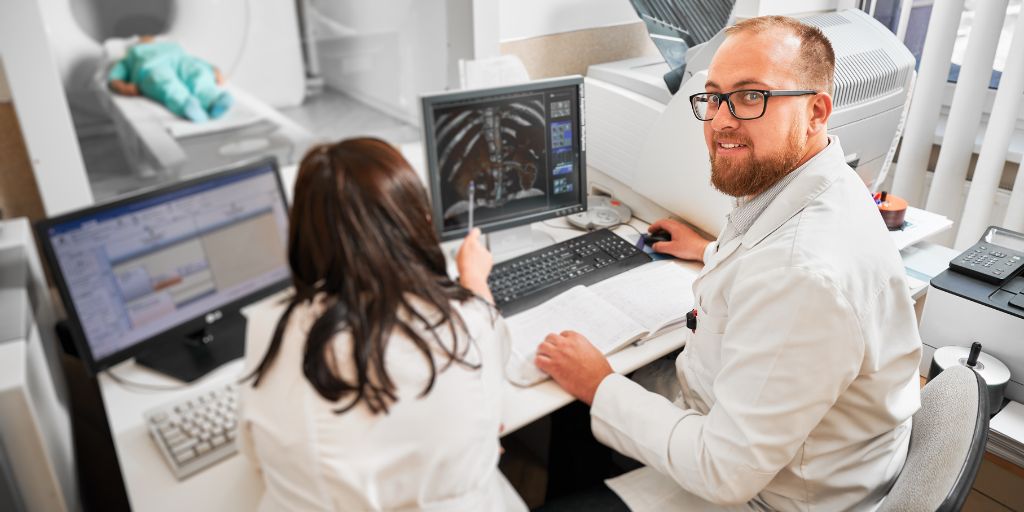
We face a moral dilemma in the healthcare sector over the coming years and one that I feel very passionately should not be ignored. What are we going to do with the excess of paper in the system?
The NHS is planning to implement some brilliant things with technology. These plans are – to some degree – clear, with a huge investment in frontline digitisation, with the electronic patient record (EPR) programme and the federated data platform (FDP) that will, over time, connect much of the structured patient information collectively across the country, but that will no doubt take time.
One of the issues facing the NHS will be delivering and deploying the technologies, and enabling data to be shared correctly. This won’t happen overnight. But let’s say, we get to this technologically advanced place in the next few years – with EPR systems holding the most recent patient history and our FDP allowing access and sharing it to create a more meaningful experience from secondary acute care to primary. And this is all linked via pathways between community and mental health, so clinicians can see exactly what they need to see.
But, what happens to all of the historical information that still lies buried in physical medical records?
What value does this information hold?
Humans have learned valuable lessons from history, including the consequences of war, the impact of cultural and technological advancements, and the importance of social and political structures. Studying history helps us understand the complexities of human behaviour, societies, and the outcomes of past actions, fostering wisdom and guiding future decisions. Everything we know and act upon today is informed by having access to and understanding our history, and healthcare is absolutely no different. Technological progression influenced by historical knowledge includes improved communication systems, medical breakthroughs, and innovations in transportation. Learning from past experiences has also contributed to the development of sustainable technologies and improved disaster response mechanisms, showcasing how history can inform and shape the trajectory of technological progress.
This is the same for being able to examine, mine and find valuable insights from historical patient records, including previous conditions, treatment, and known historical pathways – unlocking a multitude of value in doing so. Neglecting the wealth of information stored in patient history would hinder our ability to learn from past experiences and optimise healthcare delivery. Through careful examination and analysis of these records, we unlock insights crucial for enhancing the efficiency and effectiveness of healthcare services for our community.
Neglecting history risks wasting invaluable lessons and insights. History acts as a shared knowledge repository, enabling societies to grasp their roots, learn from past mistakes, and navigate toward informed choices for the future. It provides the backdrop against which current events unfold, nurturing cultural heritage and preserving a thread of continuity. Recollecting history is essential to prevent the recurrence of mistakes and to honour the
achievements and difficulties of bygone eras.
The power of our past
History is not merely a collection of dusty textbooks and ancient artefacts; it is a living repository of human experiences, a guidebook for future generations. Understanding it is of paramount importance, as it imparts invaluable lessons and insights that shape the trajectory of our future.
1. Learning from mistakes
One of the primary reasons history holds immense value is its role as a teacher. It allows us to learn from the mistakes and successes of those who came before us. By dissecting past events, societies can discern the repercussions of certain actions, fostering a collective wisdom that guides us away from repeating historical errors.
2. Informed decision-making
Knowledge of history provides context for present-day challenges. It equips individuals and societies with the tools to make informed decisions, drawing upon the lessons embedded in historical narratives. In a rapidly evolving world, understanding the past is crucial for navigating the complexities of the present and anticipating the consequences of our choices.
3. Cultural identity and continuity
History is the thread that weaves the fabric of cultural identity. It preserves traditions, customs, and the collective memory of a people. By understanding our historical roots, we strengthen our sense of identity and connection to our cultural heritage, ensuring continuity across generations.
4. Appreciation of progress
History serves as a testament to human achievements and progress. It showcases the resilience, innovation, and determination that have propelled societies forward. By appreciating the strides made in the past, individuals are inspired to contribute to the ongoing narrative of progress.
5. Ethical guidance
Many ethical and moral principles are rooted in historical perspectives. Studying the ethical dilemmas and choices made by previous generations provides a foundation for understanding the consequences of actions. It helps shape a collective ethical compass that guides societies toward responsible and compassionate behaviour.
Why the healthcare sector needs to pay attention to its history
It’s clear the value of history extends far beyond the confines of the past. It is a dynamic force that shapes our present and moulds our future. By acknowledging and embracing the lessons embedded in historical narratives, we forge a path toward a more enlightened, compassionate, and resilient future for generations to come. As the adage goes, those who fail to learn from history are doomed to repeat it; therefore, it is our responsibility to
treasure and learn from the profound lessons it offers.
With this knowledge, we can avoid repeating mistakes and missing opportunities for positive growth and development. And this is where we face a predicament in the healthcare sector. We are lurching towards a major problem of not knowing what to do with paper-based patient medical records – there seems to be no direction.
Are we going to ignore them, hope they just reach their life span and then destroy them? What will we lose if we do that, what learnings and valuable information would be lost and how would that affect our future?
There is one overriding issue that must be overcome. Whilst we reinvent healthcare IT with new systems and technology and integrate and streamline the sharing and use of data we hold, this information is only part of the patient's entire medical journey. So much of it resides on paper, in handwritten notes, and although we are storing more data like results, tests and prescriptions, electronically, healthcare professionals won’t always know instantly why they were ordered or what conditions the patient has had previously, and why they have presented again.
A data-driven future
We have a responsibility to not forget our history in every single facet of our lives. This obligation extends to our unwavering commitment when confronting the daunting task of managing the vast repository of patient records essential for delivering quality care in the present day.
The NHS spent £1.59 billion managing this issue in the last 5 years, and this figure is up year on year with one of the largest hospitals spending £40.3 million alone to deal with this problem. Therefore, this needs to be a top priority, especially when considering how tight budgets for the NHS are.
It’s fair to say that EPR systems will not deliver the true cut-over we anticipate. In fact, the Trust that spent the most in the last 5 years has had one of the leading US-based EPR systems deployed for more than 15 years and yet spent £8m in 2022-2023.
We can look at the problem though, and work on solutions to fix it, ensuring that the right records for chronic conditions are digitised. This is where the likes of innovative technologies, such as electronic document management systems (EDMS) come into play to unlock a vast array of benefits for clinicians and patients using historical patient medical information.
An intuitive EDMS provides searchable, indexable access to legacy information — structured and unstructured — at the point of care. The most beneficial outcomes as a result of an effective EDMS lie in vast improvements to clinical decision-making, enabling healthcare professionals to diagnose and treat patients with a complete view of their medical history. This, in turn, reduces appointment waiting times, allowing clinicians to see more patients in the time alleviated from searching for information, and improves appointment quality.
We have the data, so let’s use it.











